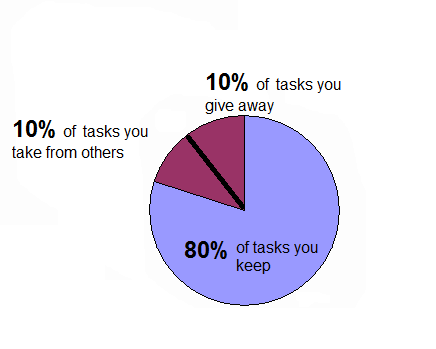


You and your fellow workers are overworked, over-connected and over-extended. For the sake of time, let’s simply say that you’re busy. Being spread too thin causes you to lose focus on the job at hand. Choose one of the time management strategies below now and increase engagement with your work and your team.
Download our free Guide here to learn how to increase engagement with your team.
Neen James, a time management expert and author of Folding Time, has countless strategies on how to manage time. Here are just a few:
The 80/20 Rule
No matter how efficient you are, you’ll rarely get everything done on your list. New things come up. Tasks take longer than expected. That’s why the 80/20 rule is important. The rule simply states that 80 percent of your output comes from 20 percent of your input. A little skeptical? Many are, but the rule has been vetted for years and is now used in numerous industries, particularly sales, marketing and time management. Forbes even featured an article on the rule, known as the Pareto Principle, earlier this year.
James suggested that before beginning your day, decide what activities will give you 80 percent of your output. Don’t be hasty in your decision. Take time to consider carefully.
Delegate
“If you’re not delegating, you’re being selfish,” said James when suggesting trainers and managers delegate more. If you’ve ever been delegated a task by your manager, you probably didn’t think it was a selfless act, but when you look closer, you’ll see things differently. By receiving work outside your usual area of expertise, you get the chance to learn and hone new skills. You become better, and you grow professionally. By giving away 10 percent of your tasks, you receive more time to grow and allow others to improve their skills.
80/20 Rule of Delegation
Neen once again advocates the 80/20 Rule for delegation. However, she puts her own spin on it.

She recommends that you keep 80 percent of your tasks, while delegating 10 percent to others. As for the remaining 10 percent, you should work on tasks delegated to you by others, particularly your manager. This will allow you to grow as a professional and possibly advance.
Reenergize
It’s easy to get lost in your work, but it’s important to give your mind and body a chance to recharge. That’s why James emphasized taking some time away from work to do something enjoyable. Even if you can only get away for 15 minutes, you’ll quickly notice the difference when you return to work, as you’ll have more energy and will be more productive.
15 Dedicated Minutes
“You’d be surprised what you can do with 15 dedicated minutes,” said James when she suggested her audience break their day up into 15-minute chunks. This strategy helps workers devote all their energies to the task at hand and helps keep distractions at a minimum. James cautioned her audience to remember that every second of the 15 minutes is to be dedicated to the task at hand and warned that multitasking would significantly hinder productivity.
Saying No
At the end of her presentation, James brought up a paradox many people tend to ignore. She said, “We often spend our days at work, working to support the ones we love, but skip out on time with them for our work.” It’s important to keep things in perspective and remember what is truly important to you. When you have a conflict between your work and a personal passion, remember you can simply say, “No.”
Editor's Note: This post was originally published in October 2014 and has been updated for accuracy and comprehensiveness. by Jordan Meyers
Don't miss out on updates and chances
to sharpen your skills with participant-centered learning.




3740 N Chestnut St #113 - Chaska, MN 55318-3053